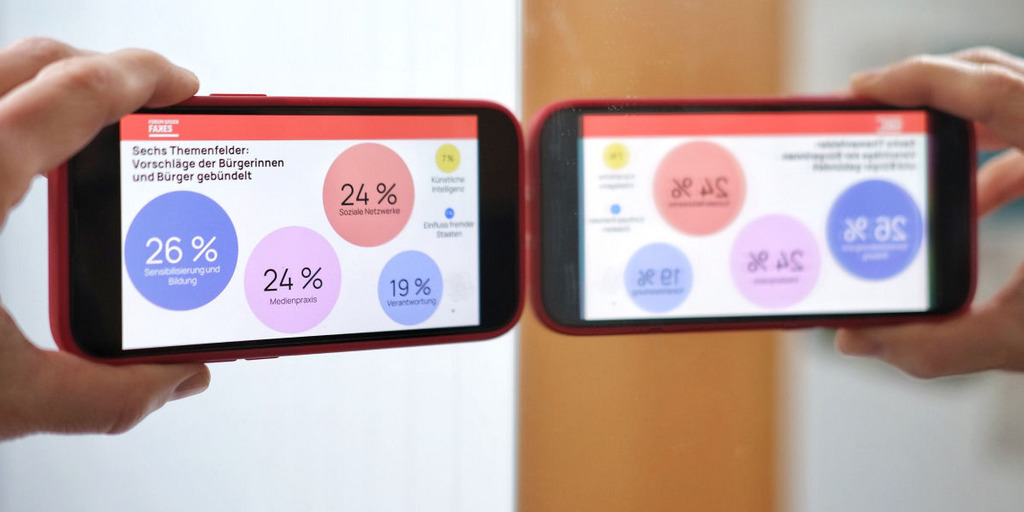Digital innovations such as high-speed internet, artificial intelligence, smartphones and social media have made it particularly easy to spread false information, and to fake images, videos or the spoken word. Since the aim of our citizen participation project “Forum against Fakes – Together for a strong democracy” is to spark a broad debate on how to handle disinformation, ensuring the involvement of the population as a whole plays a central role.
From 24. January 2024, everybody in Germany was invited to participate online and answer the following question on www.forum-against-fakes.de : “Fakes and manipulated information: What should we do to protect our democracy?”. The participation quickly developed into a broad public debate across Germany. This was partly due to the fact that the online participation format allowed participants to contribute their own ideas and proposals, and to vote directly on other participants’ proposals. The proposals give a clear picture of the priorities that citizens have set for dealing with disinformation.
Six facts from the online participation are particularly worth noting:
- A broad debate. More than 165,000 people from all over Germany have participated online and cast over 700,000 votes, so the online participation clearly met the broad approval of the general public.
- Fakes and manipulated information are perceived as a real threat to democracy. A total of 1,600 mainly very serious and concrete proposals prove conclusively that the population is intensively engaged with the problem. The ideas range from improving the population’s media literacy to labelling and tracing fake news to its source, or highlighting the problems that can result from the anonymity of social networks – the results of the participation present a diverse, multi-facetted picture of the dangers and possible solutions in the fight against disinformation.
- Three predominant issues: Awareness and education, social networks and media practice. 26 per cent of the proposals submitted are related to awareness and education, 24 per cent to media and media practice and 24 per cent to social media networks. Making up almost three quarters of all proposals submitted and evaluated, these topics represent the main concerns of Germany’s citizens in relation to disinformation.
- Foreign influence hardly an issue at all. The outside influence of foreign states in the form of disinformation campaigns aimed at destabilising democracy is an issue that is high on the list of priorities in the media and in the world of politics. This is not reflected in the citizens’ opinions: only one per cent of participants’ contributions referred to this topic.
- Measures to combat disinformation are needed. The participants contributed a large and varied range of proposals on how to deal with fakes and manipulated information. The majority of proposals (more than 70 per cent) were also rated mainly positively by the other participants, so there is a broad consensus that political and judicial measures against disinformation must be implemented.
- Different opinions about concrete measures. The final result of the online participation consists of 16 mutually agreeable and 16 controversial ideas. The citizens’ opinions are divided on the concrete form of measures to combat disinformation. Some are in favour of restrictive measures, others would prefer more personal responsibility, so it is clear that further detailed discussions are necessary before concrete proposals can be submitted to policymakers. Consequently, the next step taken by “Forum against Fakes” will be the formation of a Citizens’ Panel to deal with the results and the question of the online participation.
The online participation is part of a six-month process that combines digital participation with the work of a Citizens’ Panel. From 15. March, the Citizens’ Panel – a diverse group consisting of 120 citizens – will consider the processed results of the online participation and compile the main points arising from it. In the second phase, the online participants will give their feedback on the ideas compiled by the Citizens’ Panel. Conversely, this feedback will be a source of information on which the Citizens’ Panel will formulate concrete recommendations for action, which it will then submit to political decision-makers. The third phase will be an online vote on the three most important recommendations. On 12. September, the final recommendations for action will be presented – in the form of a Citizens’ Report – to the Federal Ministry of the Interior and Community and other stakeholders from the fields of politics, civil society and business.
“Forum against Fakes – Together for a strong democracy” is a Bertelsmann Stiftung project in cooperation with the Federal Ministry of the Interior and Community, the Stiftung Mercator and the Michael Otto Foundation for Sustainability. It is supported by the news portal T-Online, the online safety association Deutschland sicher im Netz e.V., the initiative #UseTheNews and a project advisory board.





